The faith of Islam
Islam, in Arabic, means “submission” – submission to the will of God. Faithful Muslims, therefore, submit unreservedly to God’s will and obey His precepts as set forth in the Quran and transmitted to mankind by Muhammad, His Messenger.
Muslims believe that theirs is the only true faith. Islam, they say, was revealed through a long line of prophets inspired by God. Among them are Ibrahim (Abraham), patriarch of the Arabs through his first son Isma’il (Ishmael); Musa (Moses), who received the Torah (Tawrah); Dawud (David), who spoke through the Psalms (Zabur); and ‘Isa (Jesus), who brought the Gospels (Injil). But the full and final revelation came through Muhammad, the last of all prophets, and was embodied in the Quran, which completes and supersedes all previous revelations.
As the chief source of Islamic doctrine and practice, the Quran is the main foundation of the shari’ah, the sacred law of Islam, which covers all aspects of the public and private, social and economic, religious and political lives of all Muslims. In addition to the Quran, the shari’ah has three sources: the Sunnah, the practice of the Prophet; ijma’, the consensus of opinion; and qiyas, reasoning by analogy. The Sunnah – which supplements and complements the Quran, the Word of God, and is next to it in importance – embodies the meticulously documented acts and sayings of the Prophet recorded in a body of writings called the hadith. Ijma’ is the consensus of – qualified jurists on matters not specifically referred to in the Quran or the Sunnah. Qiyas is the application of human reasoning to extend the principles found in the two primary sources – the Quran and the Sunnah – to cases involving matters unknown in the early years of Islam.
Systematized in the second and third centuries of the Muslim era (the eighth and ninth centuries A.D.), the shari’ah later developed into four major schools of jurisprudence: the Hanafi School, founded by Abu Hanifah; the Maliki School, founded by Malik ibn Anas; the Shafi’i School, founded by Muhammad al-Shafi’i; and the Hanbali School founded by Ahmad ibn Hanbal. Each of these men, all exceptional scholars, wrote or dictated long and learned commentaries upon which their schools of law were founded. Based on one or the other of these schools, learned officials called qadis to administer the law in shari’ah courts. Despite the great body of tradition and law, however, the practice of Islam is essentially personal – a direct relationship between individuals and God. Although there are imams, who lead prayers and deliver sermons, there are no priests or ministers.
To practice their faith, Muslims must accept five primary obligations which Islam imposes. Called the Five Pillars of Islam, they are the profession of faith (shahadah), devotional worship or prayer (salah), the religious tax (zakah), fasting (sawm), and the pilgrimage to Mecca (hajj).
The first pillar, the profession of faith, is the repetition of the statement, “There is no god but God; Muhammad is the Messenger of God” – in Arabic the euphonious “La ilaha illa Allah; Muhammadun rasul Allah.” It is a simple statement, yet also profound, for in it a Muslim expresses his complete acceptance of, and total commitment to, the message of Islam.
The second pillar, devotional worship or prayer, requires Muslims to pray five times a day – the dawn prayer, the noon prayer, the afternoon prayer, the sunset prayer, and the evening prayer – while facing toward the Ka’bah, the House of God, in Mecca. Like all Islamic ceremonies, prayer is simple and personal, yet also communal, and the wording of the prayers, the ablutions which are required before prayers, the number of bows, and other parts of the ritual are set out in detail.
The religious tax, the third pillar, is zakah in Arabic, a word that in the Prophet’s lifetime came to suggest an obligatory religious tax. Like prayer, zakah is considered a form of worship. It enshrines the duty of social responsibility by which well-to-do Muslims must concern themselves about those less fortunate. The zakah prescribes payments of fixed proportions of a Muslim’s possession for the welfare of the community in general and for its needy members in particular, whether Muslims or non-Muslims. This tax is often levied and disbursed by the state, but in the absence of a government collecting system it must be disbursed by the taxable Muslims themselves. In addition, all Muslims are encouraged to make voluntary contributions to the needy called sadaqah.
The fourth pillar is fasting during Ramadan, the ninth month of the Muslim year. Ordained in the Quran, the fast is an exacting act of deeply personal worship in which Muslims seek a richer perception of God and in which, as one writer puts it, Muslims assert that “man has larger needs than bread.”
Ramadan begins with the sighting of the new moon, after which abstention from eating and drinking, as well as physical continence, is obligatory every day between dawn and sunset. It is a rigorous fast, but its object is not mere abstinence and deprivation; it is, rather, the subjection of the passions and the purification of one’s being so that the soul is brought nearer to God. Fasting is also an exercise in self-control and self-denial whereby one learns to appreciate the pangs of hunger that the poor often feel. The exercise of self-control extends far beyond refraining from food and drink; to make one’s fast acceptable to God, one must also refrain from cursing, lying, cheating, and abusing or harming others.
Although rigorous, however, the fast, by Quranic injunction, also admits of a warm compassion. Those who are ill, or on an arduous journey, for example, may fast the prescribed number of days at another time; those for whom fasting is impossible may forego it if they give stipulated alms to the needy.
The month of fasting is also joyous. In Muslim regions, in modern times, the faithful – at the sound of the sunset cannon or the call of the muezzin – break their fast, perform voluntary nocturnal worship (tarawih), and throng the streets in moods that are at once festive and, in the spirit of Ramadan, communal. For those who retire and rest after the day’s fast there are, in some areas, men called mushers who, in the silent, predawn darkness beat muted drums and call the faithful to awake and eat before the long day’s fast begins again.
The last ten days of Ramadan are particularly sacred because they include the anniversary of the night on which Muhammad received his first revelation from God – “the Night of Power” – and the appearance, on the final day, of the thin edge of the new moon announcing the end of Ramadan. At that moment the favor of God descends upon Muslims and, in a spirit of joyous achievement, they begin the three days of celebration called ‘Id al-Fitr, the Feast of the Breaking of the Fast. To cement social bonds further, Islam has instituted zakat al-Fitr, an obligatory levy in the form of provisions or money for the poor, so that they can share in the joy of ‘Id al-Fitr.
The fifth pillar of Islam is the pilgrimage to Mecca – the hajj. One of the most moving acts of faith in Islam, the hajj is, for those Muslims who can get to Mecca, the peak of their religious life, a moment when they satisfy a deep yearning to behold at least once the Ka’bah – the House of God and the physical focus of a lifetime of prayer. The hajj is at once a worldwide migration of the faithful and a remarkable spiritual happening that, according to Islamic tradition, dates back to Abraham, was affirmed by Muhammad, and then, by Muhammad’s own pilgrimage, systematized into rites which are simple in execution but rich it in meaning.
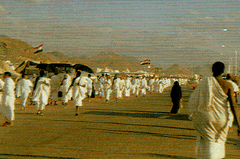
Photo: Dressed in their simple ihram garments, all pilgrims are equal in the eyes of God.
The hajj proper must be made between the eighth and thirteenth days of the 12th month – Dhu al-Hijjah – of the Muslim year, but in one sense it begins when a Muslim approaches Mecca, bathes, trims his nails and hair, discards jewelry and headgear, and puts on the ihram dress. This consists of two simple white seamless garments symbolizing a state of purity; in donning it pilgrims make a declaration of pilgrimage and pronounce a devotional utterance called the talbiyah: “Here I am, O God, at Thy Service” – in Arabic the joyous cry “Labbayk!” After donning the ihram dress, the pilgrims may enter the haram, the sacred precinct surrounding Mecca, and then Mecca itself, where they perform the tawaf – the circling of the Ka’bah – and the sa’y – the running between two hills at al-Mas’a in Mecca. All this can be part of the ‘Umrah or “lesser pilgrimage,” often a prelude to the hajj but not an integral part of it. One of the main distinctions between the Hajj and the ‘Umrah is that the ‘Umrah can be done at any time of the year, while the Hajj must be performed on specified dates.
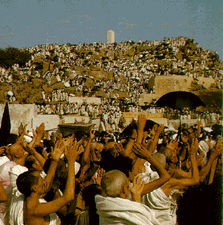
Crowds at the small town of Mina cast pebbles at pillars that symbolize evil.
The major rites of the hajj begin on the eighth day of Dhu al-Hijjah when, with thunderous cries of “Labbayk!” the pilgrims pour out of Mecca to Mina, where, as the Prophet did, they meditate overnight. On the next day they proceed en masse to ‘Arafat, even farther outside Mecca, and pray and meditate in what is the central rite of the pilgrimage: “the standing” – a few precious hours of profound self-examination, supplication, and penance in which, many says, a Muslim comes as close to God as he can, on earth.
At ‘Arafat many actually do stand – from just after noon to just before sunset – but some also visit other pilgrims or the Mount of Mercy, where Muhammad delivered his farewell sermon. The standing is not the end of the hajj but is the culmination of a Muslim’s devotional life. As the Prophet said, “The best of prayers is the prayer of the Day of ‘Arafat.”
After sunset, the pilgrims move to a place called Muzdalifah, where they gather stones for the “throwing of the pebbles” or “stoning of the pillars,” and then pray and sleep. The third day of the pilgrimage, back at Mina, they enact a repudiation of evil by throwing the pebbles at a pillar held by many to represent Satan. According to one tradition, it was in this area that Satan urged Abraham to disobey God’s command to sacrifice his son Ishmael. At Mina too, begins ‘Id al-Adha, the great worldwide Feast of Sacrifice during which the pilgrims sacrifice animals – partly to commemorate Abraham’s willingness to sacrifice his son and partly to symbolize a Muslim’s willingness to sacrifice what is dearest to him. As Muslims throughout the world perform identical sacrifices on the same day, the Muslims at Mina in effect share their pilgrimage with Muslims everywhere.
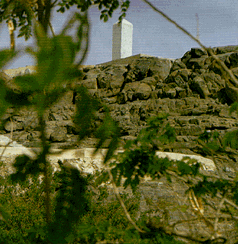
A pillar marks the Mount of Mercy the rocky hill rising from the plain of Arafat.
As the pilgrims have now completed much of the hajj, Muslim men now clip their hair or shave their heads and women clip a symbolic lock to mark partial deconsecration. The pilgrims may also, at this point, remove the ihram dress and bathe.
In Mecca the rites are concluded by the tawaf of the return, the Circling of the Ka’bah seven times on foot, an act implying that all human activity must have God at the center. After the last circuit, the pilgrims worship in the courtyard of the Mosque at the Place of Abraham, where the Patriarch himself offered prayer and, with Ishmael, stood while building the Ka’bah. The tawaf of the return is the last essential devotion of the pilgrimage; now the pilgrims have become hajjis – those who have completed the hajj. Most pilgrims also attempt to kiss, touch, or salute the Hajar al-Aswad, the Black Stone of the Ka’bah, a fragment of polished stone revered as a sign sent by God and a remnant of the original structure built by Abraham and Ishmael. Many also make the sa’y or running, a reenactment of a frantic search for water by Hagar when she and Abraham’s son Ishmael were stranded in the valley of Mecca until the Angel Gabriel led them to water in the Well of Zamzam.
It is also customary for pilgrims to return to Mina between the eleventh and thirteenth days and cast their remaining pebbles at the three pillars there and then, in Mecca, make a farewell circling of the Ka’bah. Some may also visit the Mosque of the Prophet in Medina before returning to their homes throughout the world in the “sudden, glad stillness” of those who have stood at ‘Arafat.
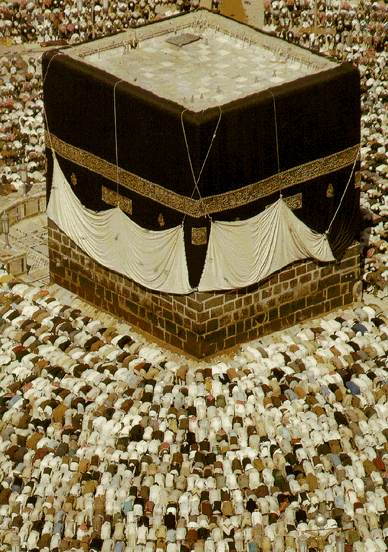
Symbol of the oneness and centrality of God, the Ka’bah stands in the courtyard of Mecca’s Sacred Mosque where at the season of the hajj the faithful gather for rituals that precede and end their pilgrimage.
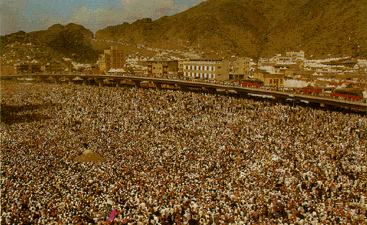
Pilgrims at the climax of their hajj, “standing” before God at ‘Arafat near the spot where Muhammad delivered his farewell sermon.
Source for images & article: islamicity.org
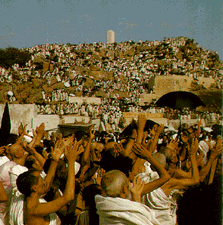

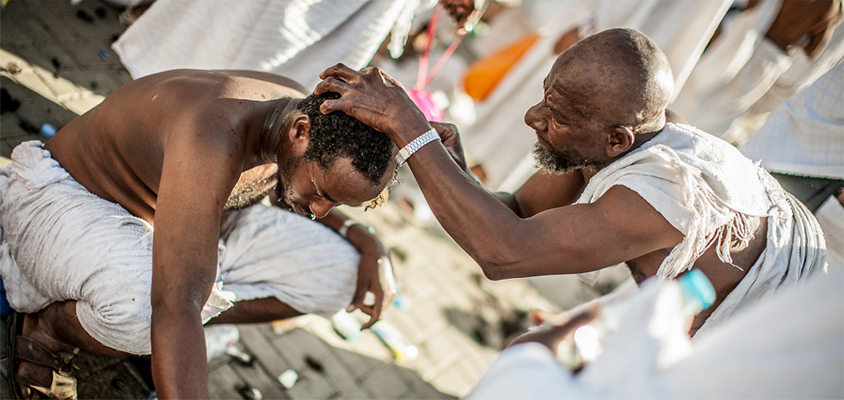
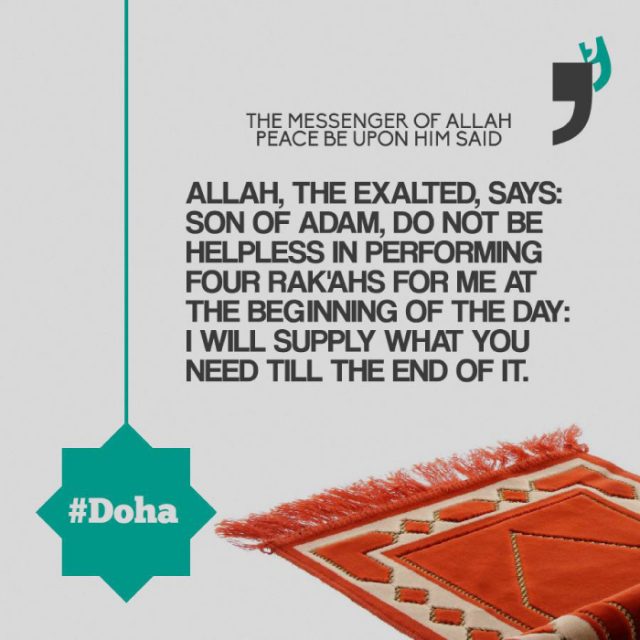
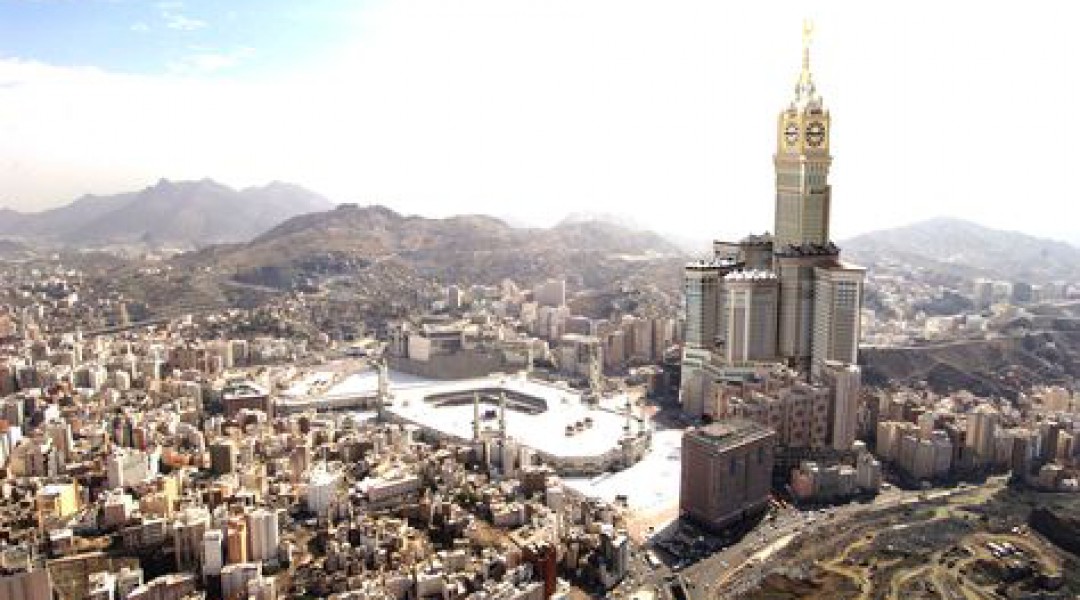
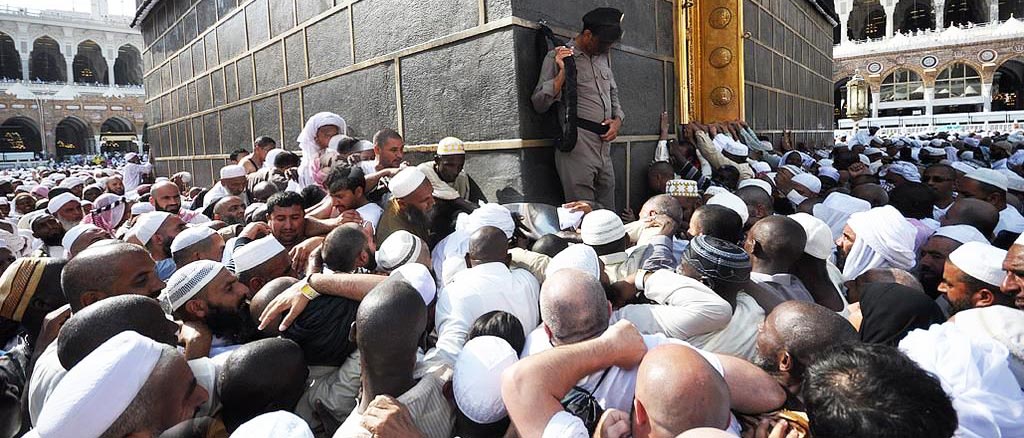
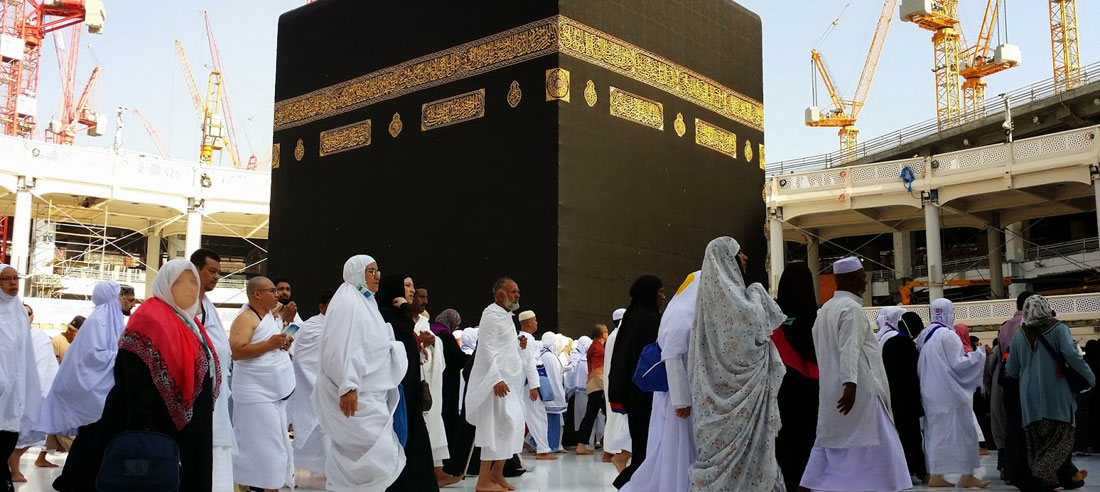
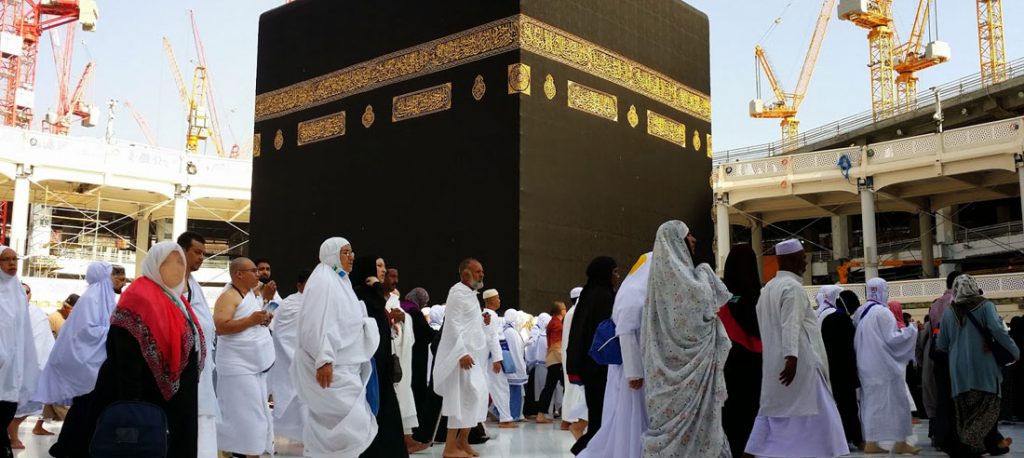
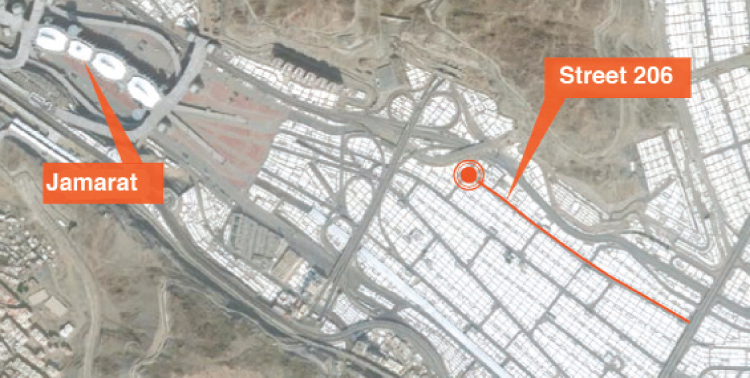
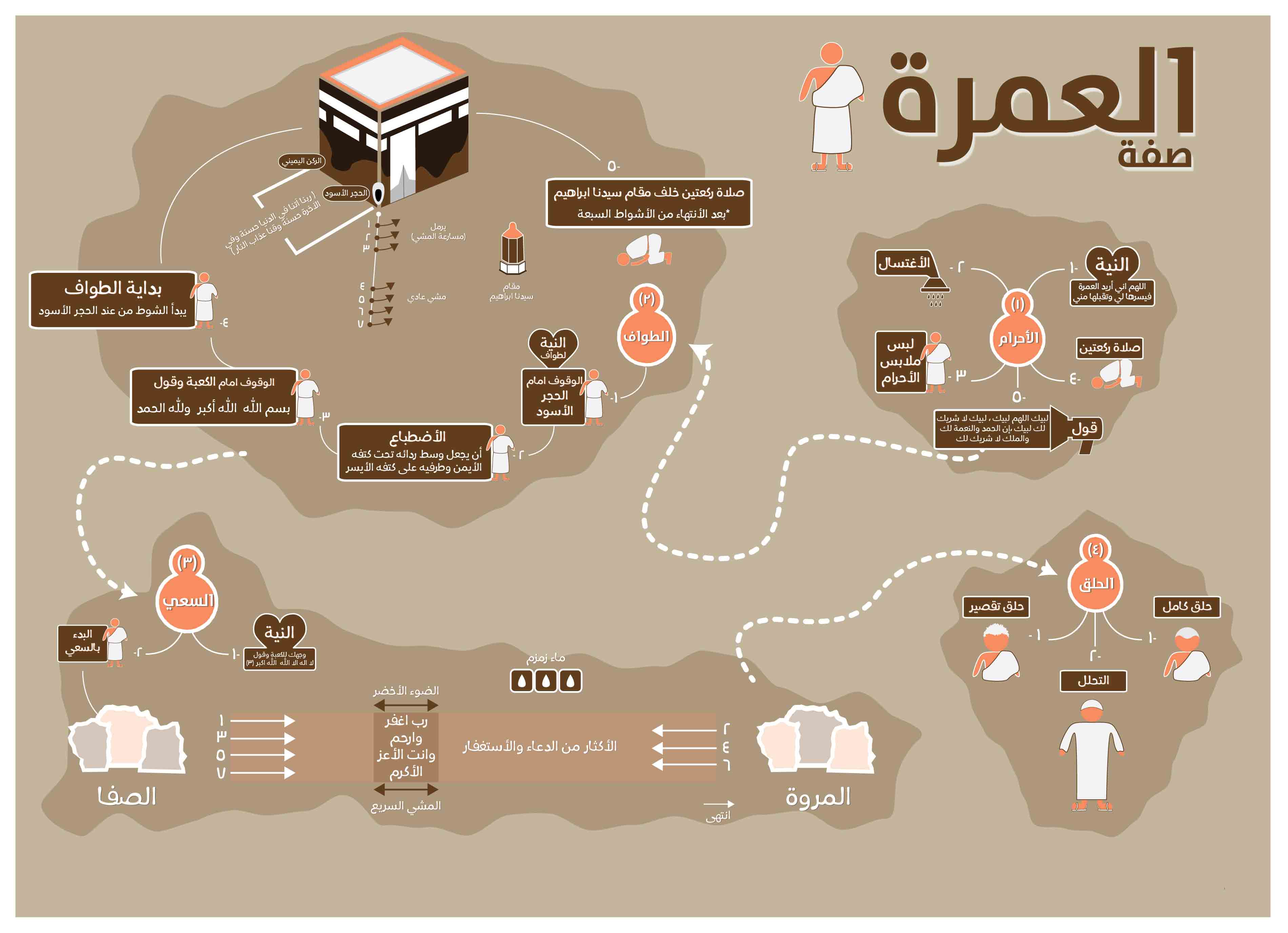
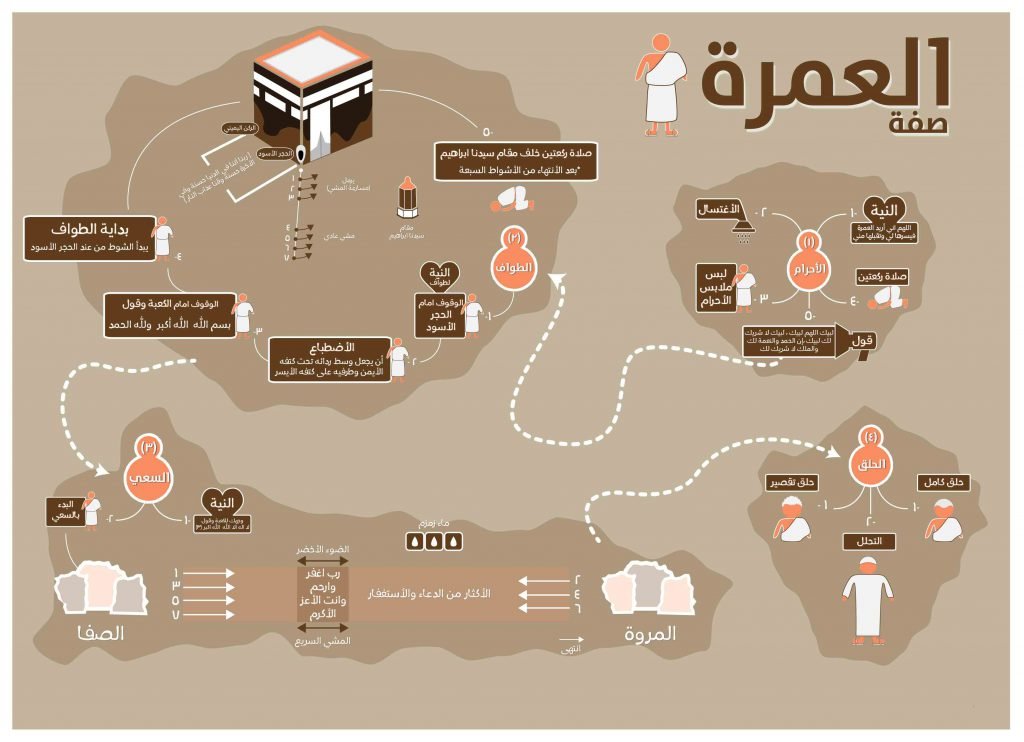 image by
image by